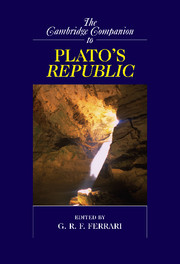Book contents
- Frontmatter
- 1 The Protreptic Rhetoric of the Republic
- 2 The Place of the Republic in Plato’s Political Thought
- 3 Rewriting the Poets in Plato’s Characters
- 4 Wise Guys and Smart Alecks in Republic 1 and 2
- 5 Justice and Virtue: The Republic’s Inquiry into Proper Difference
- 6 The Noble Lie
- 7 The Three-Part Soul
- 8 Eros in the Republic
- 9 The Utopian Character of Plato’s Ideal City
- 10 Philosophy, the Forms, and the Art of Ruling
- 11 Sun and Line: The Role of the Good
- 12 Beginning the “Longer Way”
- 13 The City-Soul Analogy
- 14 The Unhappy Tyrant and the Craft of Inner Rule
- 15 What Is Imitative Poetry and Why Is It Bad?
- 16 The Life-and-Death Journey of the Soul: Interpreting the Myth of Er
- Bibliography
- Index of Passages
- Index of Names and Subjects
- Series List
1 - The Protreptic Rhetoric of the Republic
Published online by Cambridge University Press: 28 November 2007
- Frontmatter
- 1 The Protreptic Rhetoric of the Republic
- 2 The Place of the Republic in Plato’s Political Thought
- 3 Rewriting the Poets in Plato’s Characters
- 4 Wise Guys and Smart Alecks in Republic 1 and 2
- 5 Justice and Virtue: The Republic’s Inquiry into Proper Difference
- 6 The Noble Lie
- 7 The Three-Part Soul
- 8 Eros in the Republic
- 9 The Utopian Character of Plato’s Ideal City
- 10 Philosophy, the Forms, and the Art of Ruling
- 11 Sun and Line: The Role of the Good
- 12 Beginning the “Longer Way”
- 13 The City-Soul Analogy
- 14 The Unhappy Tyrant and the Craft of Inner Rule
- 15 What Is Imitative Poetry and Why Is It Bad?
- 16 The Life-and-Death Journey of the Soul: Interpreting the Myth of Er
- Bibliography
- Index of Passages
- Index of Names and Subjects
- Series List
Summary
In the Republic Socrates and his interlocutors consider the question of how one should live (352d). As befits a work of philosophy, the question is answered by Socrates by means of arguments that are intended to be compelling because of their logical and rational qualities. The characters in the dialogue demonstrate a great interest in the question, and in the arguments brought to bear, because they perceive that what is said about it will matter for, and may well determine, how they live their own lives (621c). How is the student of the Republic to react to Socrates' arguments? Students of the Republic are free to examine Socrates' arguments without feeling that those arguments may have any impact on how they will live their lives. That is an option opened up by the autonomy of reading and bolstered by the disciplinary practice of academic philosophy, which requires indeed the examination of the arguments but not the implementation of the results of that examination in one's own life. By long practice, it has been found possible, and often intellectually advantageous, to keep life and the study of life separate.
In this chapter I argue that Plato's purpose as a philosophical writer was not merely to present compelling arguments about how one should live, but to present them in such a way that the reader would be most likely to be compelled by them to choose to live in a particular way. This is not an entirely original idea; the urgency of Plato's writing has been evident to many of his readers for a long time. But at a time when writing and reading have many multifarious purposes and disciplinary habits are entrenched, it is worth examining anew Plato's practice as a philosophical writer.
- Type
- Chapter
- Information
- The Cambridge Companion to Plato's Republic , pp. 1 - 26Publisher: Cambridge University PressPrint publication year: 2007
- 4
- Cited by

